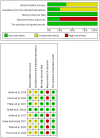Effects of mental fatigue on technical performance in soccer players: A systematic review with a meta-analysis
- PMID: 35937235
- PMCID: PMC9354787
- DOI: 10.3389/fpubh.2022.922630
Effects of mental fatigue on technical performance in soccer players: A systematic review with a meta-analysis
Abstract
Background: Mental fatigue largely influences technical performance in soccer, including offensive and defensive skills. However, these effects on technical performance among the soccer players have not yet been aggregated to be assessed systematically.
Objective: The purpose of the review was to evaluate the impact of mental fatigue on soccer players' overall technical skills.
Methods: Drawing on Web of Science, PubMed, Scopus, and EBSCOhost (CENTRAL and SPORTDicus), an in-depth search was conducted. PICOS established the eligibility criteria to select the studies as follows: (i) population-healthy soccer players; (ii) intervention-involving any mental-fatigue-prompted protocol; (iii) comparison-control conditions (active or passive without inducing mental fatigue); (iv) outcomes-technical performance (offensive and defensive skill); and (v) study design-randomized controlled trials.
Results: A total of eight studies were qualified for inclusion in the systematic literature review. Overall, the results indicate that mental fatigue had significant effects on technical skills, including offensive and defensive skills. Specifically, there were significant effects on errors (ES = 0.977; p < 0.001), number of tackles (ES = -0.739; p = 0.005), and the percentage of successful tackles (ES = -0.628; p = 0.022), while there were no significant effects on the number of passes (ES = 0.240; p = 0.328), the percentage of accurate passing (ES = -0.008; p = 0.985), and the number of successful passes (ES = -0.322; p = 0.217).
Conclusion: Overall, a significant effect of mental fatigue on the technical performance (e.g., tackles and errors) of soccer players was detected, while no significant effects on passing skills were detected. Future studies may consider investigating technical performance together with other important results (e.g., decision-making skills or internal load).
Systematic review registration: https://inplasy.com/inplasy-2022-2-0008/, Inplasy protocol 202220008.
Keywords: athletic performance; mental fatigue; motor skill; soccer; technical performance.
Copyright © 2022 Sun, Soh, Mohammadi, Wang, Bin and Zhao.
Figures








References
-
- Mooney MGA,. Conceptual model of physical performance in Australian, football [Dissertation]. University of Ballarat (2012). Available online at: https://core.ac.uk/reader/212996600 (accessed March 2, 2022).
Publication types
MeSH terms
LinkOut - more resources
Full Text Sources
Medical

